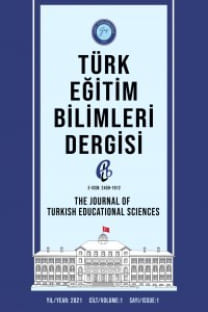İLKÖĞRETİM ÖĞRETMENLERİNİN SAHİP OLDUKLARI EĞİTİM FELSEFELERİNE İLİŞKİN ALGILARININ DEĞERLENDİRİLMESİ “ÖĞRETMENLERİN EĞİTİM FELSEFELERİ”
Bu araştırmanın genel amacı, ilköğretimdeki öğretmenlerin sahip oldukları eğitim felsefesine ilişkin görüşlerinin mezun olunan okul türü, cinsiyet, hizmet yılı ve branş değişkenleri açısından değerlendirilerek bu görüşlerin eğitimin amacı, içeriği, öğretme-öğrenme ortamı ile öğretmen ve öğrencinin rolü konularındaki görüşlerle tutarlılığının incelenmesidir. 2001-2002 Eğitim ve Öğretim yılında, Adana il sınırları içinde yer alan 12 ilköğretim okulunda yürütülen bu araştırmanın çalışma grubu, belirlenen okullarda görev yapan 186 sınıf ve 126 branş öğretmeni olmak üzere toplam 312 öğretmenden oluşmuştur. Verilerin toplanmasında Wiles ve Bondi (1984, 80) tarafından geliştirilen “Felsefî Tercih Değerlendirme” ölçeği ile kişisel bilgiler bölümü ve açık uçlu sorulardan oluşan bir anket formu kullanılmıştır. Verilerin çözümlenmesinde frekans dağılımı, aritmetik ortalama ve standart sapma hesaplamaları ile t-testi, güvenirlik analizi ve tek yönlü varyans analizi yapılmıştır. Analizler sonucunda öğretmenlerin sahip oldukları eğitim felsefelerinin ele alınan değişkenler açısından anlamlı bir şekilde farklılaşmadığı ve eğitimin amacı, içeriği, ortamı ile öğretmen ve öğrencinin rolü konularındaki öğretmen görüşlerinin de ilk tercih olarak belirtilen eğitim felsefesi ile bazı istisnalar haricinde tutarlılık göstermediği ortaya çıkmıştır.
Anahtar Kelimeler:
Eğitim felsefesi, felsefî görüş değerlendirme formu, sınıf öğretmeni, branş öğretmeni
EVALUATION OF ELEMENTARY SCHOOL TEACHERS’ PERCEPTIONS ABOUT THEIR OWN EDUCATIONAL PHILOSOPHIES
The main purpose of this study is to evaluate elementary school teachers’ perceptions about their own educational philosophy in terms of some variables including type of school graduated from, sex, experience and branch and to evaluate the consistency between teachers’ perceptions and their views about aims and contents of education, teaching-learning environment and teachers and students roles in learning – teaching process. This study carried out in 12 elementary school in Adana Central Districts, in 2001 – 2002 educational year. Sample of the study consisted of total 312 teachers (186 classroom teachers and 126 subject matter teachers). “Philosophy Preference Assessment” scale developed by Wiles & Bondi (1984,80) was used to asses perceptions of teachers’ educational philosophies. Data about independent variables were collected by using a questionnaire. To analyse the data frequency distribution, mean, standard deviation, t-test, reliability analyse and one-way ANOVA statistical techniques were used. İt is found that there are no significant differences between teachers’ educational philosophies and their sex, type of school graduated from, experience and branch. It is also found that, there are no consistency between teachers’ views about aims and content of education, teaching – learning environment and teachers and students roles in teaching -–learning process and their primary preferences of educational philosophies.
Keywords:
Educational philosophy, philosophic perceptions evaluation form, classroom teacher, subject matter teacher,
- Başlangıç: 2003
- Yayıncı: ANKARA HACI BAYRAM VELİ ÜNİVERSİTESİ
Sayıdaki Diğer Makaleler
TOPLAM KALİTE SİSTEMİNİ OLUŞTURMADA TEMEL AŞAMA: STANDARTLARIN BELİRLENMESİ
ÖGE GÖSTERİM TEORİSİ’NİN İLKÖĞRETİM MATEMATİK ÖĞRETİMİNDEKİ ETKİLİLİĞİ
SINIFTA İLETİŞİMDE KARŞILAŞILAN DAVRANIŞ PROBLEMLERİ
Toplam Kalite Sistemini Oluşturmada Temel Aşama: Standartların Belirlenmesi
KARŞILAŞTIRMALI EĞİTİM: TÜRK EĞİTİM BİLİMLERİ ÇALIŞMALARI İÇİNDE ÖNEMSENMESİ GEREKEN BİR ALAN
